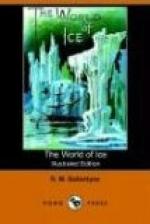“That’s ’ow it is, sir,” Mivins used to say, when spoken to by Fred on the subject; “I’ve never bin in cold countries myself, sir, but I’ve bin in ‘ot, and I knows that with a stout pair o’ legs and a will to work, a man can work ’is way hanywhere. Of course there’s not much of a pop’lation in them parts, I’ve heerd; but there’s Heskimos, and where one man can live so can another, and what one man can do so can another—that’s bin my hexperience, and I’m not ashamed to hown it, I’m not, though I do say it as shouldn’t, and I honour you, sir, for your filleral detarmination to find your father, sir, and—”
“Steward!” shouted the captain down the cabin skylight.
“Yes, sir!”
“Bring me the chart.”
“Yes, sir,” and Mivins disappeared like a Jack-in-the-box from the cabin just as Tom Singleton entered it.
“Here we are, Fred,” he said, seizing a telescope that hung over the cabin door, “within sight of the Danish settlement of Upernavik; come on deck and see it.”
Fred needed no second bidding. It was here that the captain had hinted there would, probably, be some information obtained regarding the Pole Star, and it was with feelings of no common interest that the two friends examined the low-roofed houses of this out-of-the-way settlement.
In an hour afterwards the captain and first mate with our young friends landed amid the clamorous greetings of the entire population, and proceeded to the residence of the governor, who received them with great kindness and hospitality; but the only information they could obtain was that, a year ago, Captain Ellice had been driven there in his brig by stress of weather, and after refitting and taking in a supply of provisions, had set sail for England.
Here the Dolphin laid in a supply of dried fish, and procured several dogs, besides an Esquimau interpreter and hunter, named Meetuck.
Leaving this little settlement, they stood out once more to sea, and threaded their way among the ice, with which they were now well acquainted in all its forms, from the mighty berg, or mountain of ice, to the wide field. They passed in succession one or two Esquimau settlements, the last of which, Yotlik, is the most northerly point of colonization. Beyond this all was terra incognita. Here inquiry was again made through the medium of the Esquimau interpreter who had been taken on board at Upernavik, and they learned that the brig in question had been last seen beset in the pack, and driving to the northward. Whether or not she had ever returned they could not tell.
A consultation was now held, and it was resolved to proceed north, as far as the ice would permit, towards Smith’s Sound, and examine the coast carefully in that direction.
For several weeks past there had been gradually coming over the aspect of nature a change, to which we have not yet referred, and which filled Fred Ellice and his friend, the young surgeon, with surprise and admiration. This was the long-continued daylight, which now lasted the whole night round, and increased in intensity every day as they advanced north. They had, indeed, often heard and read of it before, but their minds had utterly failed to form a correct conception of the exquisite calmness and beauty of the midnight-day of the north.




